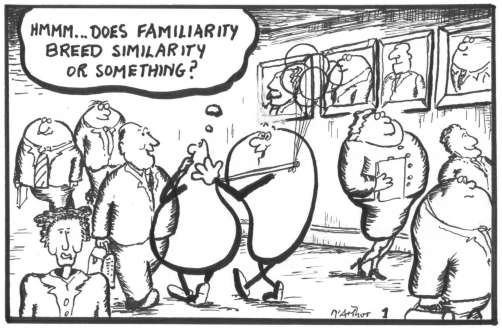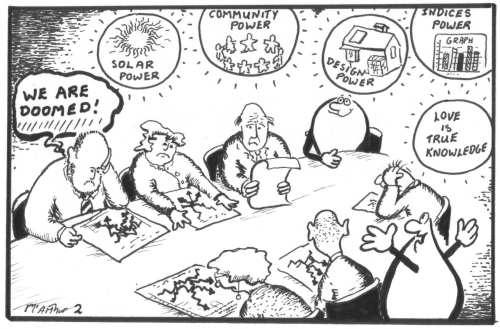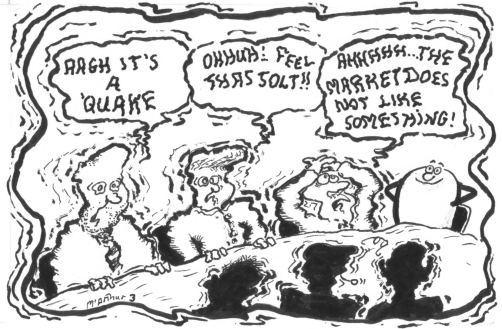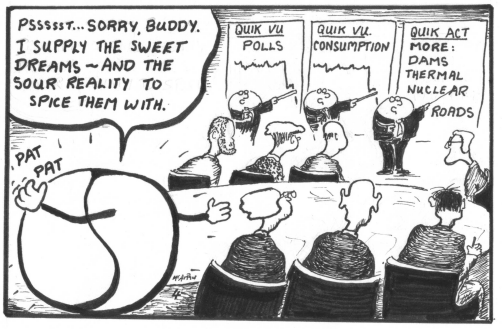| Bonus Joules and the Knowledge Economy | |||||
|
|
The
Powers of Junk Joules
Bonus Joules and the Knowledge Economy: All images on this site are copyright 2001 and you are free to use them with care.
Blog by Dave McArthur 25 July 2007 Does democracy
still exist in a country where people can vote for their Members of
Parliament but those Members are powerless to manage critical
infrastructure. No? Then New Zealand is not a democracy. It’s just a
black box. In New Zealand
critical infrastructure such has the 230 volt electrical meters in our
dwellings are just black boxes for us i.e. pieces of technology over
which citizens have no say or control. All we vaguely sense and know is
this black box is working against our interests. It’s sucking our
wealth away. This disempowerment pretty much makes the whole country a
black box. My June 14 blog
was dedicated to the memory of Folole Maliaga. Folole died soon after
her local Bulk-gen electricity supplier turned off her breathing support
system. In that blog I attempted to put her death in the context of New
Zealand’s use of our electrical potential this last hundred years of
so. My July 14 blog continued this theme by illustrating how our
Electricity Commission is framed to fail us. The
first event that highlighted how much New Zealand is now a failing
democracy was an American report I read. That nation too is on the
verge of imploding but it still sustains levels of critical thinking
far superior to ours. I am privileged to be able to contribute to the
Sustainable Energy Forum and the article prompted me to make the
following posting: HI SEF, There is a
growing consensus that democracy in the USA is diminishing fast in a
wide range of areas. The consensus is based on statistics such as rising
imprisonment rates and wealth inequity, the continuing slaughter of the
Iraqi and other peoples, media control trends, its flawed electronic
voting system etc. However elements of democracy still exist and some
robust debate continues over critical issues. For example: The article ends: The iPhone is political because
it somehow manages to capture the essence of authoritarianism in its
shiny little box. Totally locked down, it runs only preapproved software
on a prechosen phone network that is subject to government surveillance.
Long live the iPhone! Long live democracy! Meanwhile, digital freedom
lovers have been up in arms over Apple's many closed-door policies for
the phone. Not only are the damn things locked into using AT&T as a
carrier, but iPhones are also designed to prevent users from writing
additional software for them. Nothing but Apple-approved software may
run on the iPhone. That means people who want to play music on the
iPhone will have the same problems they have with iTunes on the iPod --
you can put as much music on the phone as you want, but you can't
transfer it to another device. Nor can you choose a secure browser over
Safari, or an e-mail program of your choice. Even free-software activist
Richard Stallman is pissed about the iPhone, and he's a guy who rarely
gives little toys from Apple a second thought. So what's the big deal? Why do
people even want a $600 phone, and why has this luxury device for the
pampered techie become such a hot political issue? I think the answer to
the first question is easy: the iPhone is the first truly cool
convergence phone that combines multimedia with multispectrum goodies
like Bluetooth, wi-fi, and of course, a phone network. Who doesn't wish
to combine phones, iPods, and laptops into one nifty thing? That's where politics come in.
In the United States we have a long history of government regulations on
the phone network, as well as on what can plug into the phone network,
so naturally the public wonders what the government is going to do with
the iPhone. Especially when other
components of the iPhone, such as its ability to play music, touch on
another government-regulated area: copyright law. And then there's
another issue that few people have commented on, which is that Apple's
chosen carrier for the iPhone, AT&T, has a history of letting the
government spy on its phone networks. So every way you slice it, the
iPhone is subject to government. What does this
suggest about the state of democracy in New Zealand? We are faced with
an even more critical issue and there is profound silence. The issue?
How we use the stuff that underpins our civilisation and which is vital
in determining whether we make the transition beyond the Cheap Oil/Gas
Age. I refer to our rights and capacities to make use of our electrical
potential. The
Commission held a technical forum at Te Papa on 17 and 18 July 2007 for
reconciliation (retailers, data administrators, network owners, and
distributors) and metering participants (meter owners and test houses). Note – link includes pdfs of presentations. I did not attend
because I did not know to attend and anyway the forum seems worded to
exclude public interest and involvement.
I do not recall postings about it on the Sustainable Energy
Forum, less still any debate. Indeed on two occasions recently I posted
detailed statements on SEF in which I backgrounded how this critical
issue is framed in fascism. I pointed out our Parliament has yet again
endorsed the 1998 Electricity Reforms that disenfranchised 99.999% of
us. I pointed out that the common 19th Century switch board
in dwellings is about to undergo an unprecedented revolution with the
convergence of broadband, distributed generation, smart appliance,
demand/response, metering, radiotelecomunications etc. I pointed to the
ARC technology as a precursor example of first
truly cool convergence switchboard that combines all the above goodies. I understand 5000
Hawkes Bay and about 30,000 Christchurch dwellings are fitted with this
technology now. Individuals and
communities no longer have an effective vote on how we use our
electrical potential. We no longer own
the knowledge of how we live and how our dwellings are used. We can no longer
pool our collective intelligence to combine our electrical potential
with other local resources. Our Parliament
has reaffirmed the current ownership regime which states that we cannot
effectively own our own switchboards (metering and response switches)
and we are not permitted to communicate household data to who we like eg
consumer advocate group, local territorial authority or other group of
our choice so they can buy and sell Bulk-gen and Dwelling- gen
electricity on our behalf. The legislation
effectively mandates that the information of how we use our electrical
potential is the property of the Bulk-gen electricity company of our
“choice”. We have no choice about using other trading mechanisms
than Bulk-gen electricity companies. As you can see,
all the arguments and issues surrounding the iPhone exist here with one
critical difference. As the iPhone article points out this piece of
technology is at present just a plaything for the wealthy. The dwelling
switchboard determines whether people live or die in some cases. In poor
households it demands all discretionary income. It shapes the household
psyche and the shape of our land and the balances of the air that we
breathe. The deafening
silence on SEF is not unique. It echoes through our universities and our
media. Not one media (TVNZ, Sunday Star Times, not even SCOOP)
acknowledged receipt of my missives on the subject. I doubt there was a
single representative from any of our major media present at the
conference. As SEF knows, I
have repeatedly written to Dr Keith Turner, CEO of Meridian Energy,
controller of ARC technology, asking if citizens will have the right to
broadcast their dwelling data to the institution of their choice. I also
asked what protections are in place to prevent a Bulk-gen company
trading our dwelling’s data with other companies, just as we citizens
are now traded between companies. I also asked if we are permitted to
have reversible metering with the technology (as is common in greater
democracies such as USA and Australia). A year on and he still has not
acknowledged receipts of my letters even. Maybe the
widespread silence is because people are too preoccupied to acknowledge
how issues surrounding ownership the “metering” technology and its
knowledge potential go the heart of sustainability (democracy) in a post
Cheap Oil/Gas Age. Maybe people are “too busy” to be concerned about
democracy. Maybe people just don’t care about democracy. I know some
on SEF approve of the Electricity Reforms and so their silence is
understandable. All I know is that the Sustainability Principle predicts
the Electricity Reforms and lack of effective concern for democracy will
have dire consequences for humanity if replicated globally. Hey, I just think
I have written a blog for my website. May all know that
energy is sustained. Dave *************************************************************** Before discussing
the other signal event this week I will give out the Junk Joules Award
for this blog. It goes to all those who advised our Prime Minister that
New Zealand should become a “carbon neutral nation”.
The concept is nonsense. Dangerous nonsense. We are Carbon
Beings. We cannot escape responsibility for our use of carbon. The
danger of the nonsense is that the concept blinds us to the impact of
our use of carbon in the form of coal, Natural Gas and oil. Our chronic
waste uses of these, especially oil, is the source of our inflation with
its resultant wealth loss in the form of excessive rates of household
debt growth, homeless young, Reserve Bank interest and trading dollar
values. The nonsense is
also dangerous because it actively destroys our spirit of stewardship. To quote a Times
of India report: India leads the pack
and is likely to be rewarded for its newly-revealed climate change
‘cool’ with trend-setting 'green' financial banking instruments,
such as solar panel or biogas mortgages, specially developed for it by
HSBC. The 'green' financial packages for Indian customers would be the
first in the world. The index, based on a survey of 9,000 people across
four continents, demonstrated that 60% of Indians were deeply concerned
about climate change, compared to just 22% in the UK and 26% in Germany. I
posted the link on SEF and a respondent pointed out the survey was
only of the affluent Indian middle class. My comment was that this
made the study all the more relevant. The Indian middle class is about
250 million and comparable to the mass middleclass of Europe and the
USA. My SEF posting, with the subject title Asia=Future?
Electricity Commission = No Future? below predates reading the
article on the impacts of technology convergence as in the iPhone. Hi SEF and Murray A couple of other
quick reflections on the 'Climate Confidex Index’ survey. In 2000 I found
myself in the position of teaching the nature of energy as part of an
“energy efficiency” resource. I soon realised that what I had been
taught in New Zealand was confused and conflicting. The whole language
surrounding the topic is hopelessly compromised here. I now find that
even our use of the science symbol is fatally flawed. Earlier this year
I proposed on SEF a principle of energy, which I am tentatively calling
the Sustainability Principle: “When a symbol use works
to deny change it will materially alter the potential of the universe
(energy) in a way that results in a reduction in the capacity of the
symbol user to mirror reality. When a symbol use works for the
acceptance of change it will increase the capacity of the symbol user to
mirror reality.” This emerged from
my analyses of our use of key power/energy/climate symbols as to
whether they supported or denied the Conservation Principle of Energy.
As I may have mentioned on SEF I posted it to my daughter who was
studying the ancient knowledge of the Buddha in India. She informed me
that there was remarkable congruence. In brief the
Sustainability Principle can be used to evaluate whether a symbol use or
strategy will tend to generate harmony and well being or war and misery.
Which is what SEF theoretically is all about. My research six
years ago into the immediate sources of NZ’s current unsustainable
uses of the energy and power symbols indicated the USA was
the most profound source with Europe having a distinct influence too. By
contrast I found Asia retained a far higher level of science in its use.
(I summed the
global picture up in this cartoon about 2002 The
quasi-religious language is deliberate as the use of these symbols
reflects deep held beliefs about the nature of existence.) Germany is an
interesting case. Though its symbol use had major flaws I found it was
far more scientific than Anglo countries, which of course includes us.
This was reflected in comparatively more sustainable developments in
technology. However I have
noticed this century a rapid decline in the sustainability of its symbol
use and now there are even moves to create a Ministry of
Energy. This is
a recipe far worse than limbo – its more a recipe for hell! The
Sustainability Principle also predicts that movies such as The Day
After Tomorrow (which the Potsdam Institute advised on) and An
Inconvenient Truth will have worked to increase dissonance with the
climate in the wider German culture. Potsdam’s own research of the
impact of TDAT showed it undermined public confidence in climate
science. At one point he
asked me how do we build houses in New Zealand. So I mapped him out a
standard dwelling based on the Building Codes handbook 3604. According
to his calculations there is no way our buildings meet the legislated
standards. For instance where an envelope of R1.9 is required our
technology can only attain R1.6. His calculations were checked by an
independent engineering company and found to be true. As part of my
research I have compared the psychology of various regions in terms of
their religions etc. Speaking very generally European sourced psychology
tends to deny change and concepts of personal stewardship compared to
the Asian area. It is the latter psychology that drives my use of carbon
now, for instance and which puts me at odds with the carbon trading
ethos. This Asian sourced psychology also enhances my capacity to
grapple with the paradoxes inherent in the Uncertainty Principle. I discuss the
dilemma KiwiSaver puts me in re carbon in my latest blog that I have
just posted. I devote much of it to reflections on the Electricity
Commission public update on the state of “the electricity market” in
Wellington last week. Two things were very clear to me. The Electricity
Commission cannot be a sustainable force while our Parliament makes it
subservient to the current ownership regime. The second thing is that
our current lack of democracy means we are going to be denied the
benefits of the confluence of broadband-metering-telephone technologies
and left only with the risks of it. The blog can begins: KiwiSaver
= KiwiKiller and Carbon Polluter? As I deconstruct the hype this scary
equation emerges complete with inflation and the end of universal
superannuation. What’s a bloke to do? India managed to
create an electron voting system that contained three sets of safeguards
to prevent vote tampering within the system. The USA has not managed to
create an electronic voting system with one set of safeguards and there
is growing evidence that tampering of votes within the system enabled
the current President to bypass democracy in two elections now. The
Sustainability Principle suggests a nation that confuses oil with energy
is at great risk. One of the great risks is that because all forms,
including oil, are limited then as the commodity becomes scare the
economy will suffer destructive forces such as wealth-depleting
inflation and increasingly volatile currencies. Which are this
morning’s headlines in New Zealand. The Reserve Bank is as impotent as
the Electricity Commission. All the best Dave And finally a quick intro to the cartoon that accompanies this. It was first published in 2003. New Zealand had been binging on Bulk-generated electricity and the hydrodams were a bit low. Bonus Joules has arrived at Parliament as part of the search to understand the nature of energy and finds the place in having an “energy” panic. Junk Joules emerges as the complementary, coevolving twin of Bonus Joules and here we see how dominant Junk Joules is in New Zealand. |
|
|||




